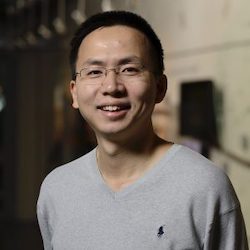
Join the Center for Robotics and Biosystems December Seminar
Speaker: Chen Li, Assistant Professor, Mechanical Engineering and Laboratory for Computational Sensing and Robotics at Johns Hopkins University
Date and Time: Friday, December 3 at 3:00 p.m. CT
Location: Hybrid Seminar in Tech LR3 and Zoom
Zoom Link: https://tinyurl.com/CRBSeminar
• NU-authenticated attendees will be automatically admitted. Others, please email Amy Nedoss at amy.nedoss@northwestern.edu to be admitted from the waiting room.
Abstract
We understand fairly well how terrestrial animals use and control interaction with the environment to generate and stabilize near-steady-state, single-mode locomotion such as walking and running on relatively flat surfaces, and many bio-inspired robots are becoming robust at doing so. It is because we understand such interaction as well as we do that we have Boston Dynamics robots. However, robots are still far from robust in being able to traverse (not avoid) complex 3-D terrain with obstacles as large as themselves, an ability required for applications like search and rescue in rubble and debris, environmental monitoring in forests and mountains, and sample collection through cluttered extraterrestrial rocks. By contrast, many animals do so at ease by dynamically transitioning across different modes of locomotion. Here, we review our lab’s progress towards filling this gap by revealing how to use and control physical interaction with the environment to make locomotor transitions. We take an interdisciplinary, integrative approach at the interface of biology, engineering, and physics. Considering the heterogeneity of complex 3-D terrain, as a first step, we abstract from it distinct model challenges and create platforms analogous to wind/flow tunnels to enable controlled, repeatable experiments. We study legged and limbless model organisms (cockroaches and snakes) capable of robust locomotion in complex 3-D terrain in these platforms and develop techniques to measure locomotor-terrain interaction in detail. We also create and test robotic physical models of the animals to further enable systematic locomotor parameter variation and controlled studies of feedforward and feedback control strategies. Finally, we perform physics modeling to understand how locomotion emerges from physical interaction and can be controlled by the animal or robot. For the abstracted locomotor challenges, the general physical principles and strategies revealed already advanced robot performance. We are working towards further understanding how to sense physical interaction during locomotion and use feedback control and reactive planning to enable robust transitions across heterogeneous complex 3-D terrain.
Bio
Chen Li is an Assistant Professor in the Department of Mechanical Engineering and a faculty member of Laboratory for Computational Sensing and Robotics at Johns Hopkins University. He earned B.S. and PhD degrees in physics from Peking University and Georgia Tech, respectively, and performed postdoctoral research in Integrative Biology and Robotics at UC Berkeley as a Miller Fellow. Dr. Li’s research aims at creating the new field of terradynamics, analogous to aero- and hydrodynamics, at the interface of interface of biology, robotics, and physics, and using terradynamics to understand animal locomotion and advance robot locomotion in the real world. Dr. Li won several early career awards, including a Burroughs Wellcome Fund Career Award at the Scientific Interface, a Beckman Young Investigator Award, and an Army Research Office Young Investigator Award, and selection as a Kavli Frontiers of Science Fellow by the National Academy of Sciences. He has won a Best PhD Thesis award at Georgia Tech and several best student/highlight/best paper awards (Society for Integrative & Comparative Biology, Bioinspiration & Biomimetics, Advanced Robotics, IROS).
To learn more, visit Terradynamics Lab at: https://li.me.jhu.edu/.
Audience
- Faculty/Staff
- Student
- Graduate Students
Interest
- Academic (general)